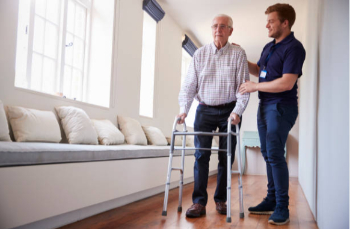Assisted Living vs Memory Care
 Memory Care vs Assisted Living
Memory Care vs Assisted Living
Aging can be a challenging time, and there may come a time when we need to consider alternative senior care options for our elderly loved ones. Our elderly loved ones may be reluctant to consider such options, so it is our responsibility to understand the reasons for their concerns, so that we may develop a senior care plan to best help them.
We shall consider how there are now increased options for elderly with Alzheimer’s and dementia, due to the growing prevalence and incidence of these health conditions, particularly among elderly. Also, as the senior citizen population is the fastest growing population, more residential care homes offer services particularly suited to provide the best senior care and support to help our elderly loved ones live as independently as possible.
While some elderly may find their decreased independence to be challenging, this detailed breakdown and comparison of memory care and assisted living may help to assuage some doubts and concerns.
Assisted Living Overview
Assisted living facilities is the ideal option for those who prefer to maintain their independence but may require extra support with some day-to-day activities. Arguably, the most valuable element of assisted living is the availability of trained senior caregivers who can help with a wide range of needs, particularly activities of daily living and instrumental activities of daily living. For example, your elderly adult will receive support with dining services, laundry services, and medication management.
However, assisted living facilities also provide important opportunities for social interaction and senior socialization. Did you know that one of the greatest challenges facing the elderly today is senior isolation and loneliness? Your elderly loved one will be surrounded by friendly staff and other golden age residents. Assisted living facilities also host social events and excursions.
Although some may be wary at first, an assisted living facility can be a great way to meet new people and create friendships in later life. Socializing is an important factor for improved health status. However, senior socialization may be more limited for a senior with limited mobility or another disability who lives independently.
Furthermore, assisted living facilities provides 24/7 senior care, and there will always be an immediately response to a medical emergency. The trained senior caregivers can help with ensuring your loved one takes their medication on time, and the trained assisted living facility nurses will be available to coordinate the proper senior care in the case of any medical related issues. In fact, senior caregivers will always be on the lookout to notice if there are any unusual health changes or observances with their senior residents, in order to prevent the development of any health conditions or to control the onset with early detection and diagnosis. This could be life-saving in a situation where a senior person would have otherwise suffered alone, and potentially may have been unable to call for immediate medical help.
Assisted living facilities strive to support your loved one to live as independently as possible, while enjoying a support network for constant senior care and social support. Assisted living facilities can relieve the stress of having to cook for oneself and the hassle of needing to visit the supermarket, while also providing support with feeding for those seniors may be unable to feed themselves.
Learn more: When it is Time for Assisted living?
Memory Care Overview
Memory care units can also form a part of an assisted living facility, and can provide specialized treatment for those while Alzheimer's or dementia. Similarly to assisted living, memory care units are designed to provide the extra support, care, and safety features to best support elderly with cognitive declines.
Memory care units are designed to better focus the senior care services as according to the routine and needs of the memory care residents. Activities are often organized around promoting memory stimulation and relaxation, as stress can often be associated with Alzheimer's and dementia. However, the accommodations of memory care ensure the safety of its residents through 24-hour supervision, and the placement of wandering guards to allow for wandering safely within the memory care unit.
Unlike in general assisted living facilities, staff in memory care units have received specific training about how to provide the best senior care for residents with Alzheimer’s and dementia. For example, memory caregivers can interpret behavior within the context of Alzheimer's and dementia and understand why a certain elderly adult may be acting in a certain way, and know how best to communicate with those seniors exhibiting disruption.
On the downside, because memory care units offer such high levels of specialized care, memory care units are on average more expensive than assisted living facilities. However, the return on investment is worth it to ensure your elderly loved one receives the most appropriate and specialized senior care.
Learn more: Proper Dementia Care
The Admission Criteria for Assisted Living and Memory Care
The admission criteria for assisted living facilities depends on the level of care required and if the senior living facility has the infrastructure to meet such needs. Assisted living facilities are best for those seniors who are still able to maintain a certain level of independence but may benefit from additional extra senior support, and do not require 24-7 clinical nursing care.
Past a certain level of senior care, an elderly person may be recommended to receive more intensive and specialized senior care if their memory disruption condition advances. Elderly adults with memory issues may endanger the well-being of themselves and other residents. Memory care services go the extra mile to ensure the best dementia care is provided to help elderly adults with cognitive declines manage their activities of daily living. Some senior care services that are unique to memory care aim to improve the security of a loved one by monitoring and supervising their wandering 24 hours a day.
For both assisted living facilities and memory care units, it is recommended to ask the senior care provider about their unique requirements and paperwork. For example, the facility may request the following:
- Facility-specific admission paperwork
- A record of the elderly adult’s physical and medical history - this may also include specific reports from the doctor who gave a diagnosis for the memory disrupting condition
- Paperwork to indicate how recently chest x-rays, tuberculosis tests, and important vaccinations were received
 Staffing Requirements for Assisted Living and Memory Care Facilities
Staffing Requirements for Assisted Living and Memory Care Facilities
A facility is only licensed if it has passed state and federal regulations. Adequate specialized staff must be available at all senior living facilities to meet the constant needs of all admitted seniors. Supporting seniors with different levels of memory-affecting ailments can be quite a complex task that can lead to a legal mess if the care is not proper and adequate. The entire staffing structure of assisted living facilities and memory care units is therefore strictly regulated.
At any time of the day, the facility must have a full-time administrator and director of nursing services to overlook daily operations. On special occasions that may warrant the absence of the administrator and director of nursing services, a temporary leader must be appointed. Direct care staff must possess the senior caregiver qualifications to formally tend to the various activities of daily living and instrumental activities of daily living. This is exclusive of health maintenance roles which require a qualified medical practitioner.
Medication is administered by certified aides who are specialized in assisted living or memory care facilities. Such facilities are allowed to hire proxy caregivers, otherwise known as unlicensed practitioners, who have gathered practical experience working and training under licensed caregivers. Their specific role does not include administering medications, but may help the seniors with ensuring they are taking their medications as directed. Your loved one does not have to use the services of proxy caregivers. Also, before any direct contact is established with any proxy worker, the senior resident or their representative must sign and agree to a formal consent.
Staff Recruitment
It is also important to know that staff recruitment is heavily regulated to ensure there is an adequate number of staff in assisted living facilities and memory care homes for the quantity of beds. All new personnel have to be thoroughly trained to provide the best senior care. All staff are also heavily vetted before they are hired, and must undergo an extensive background and criminal history check, including checking their fingerprints. Your loved one’s security is a top priority for senior living facility managers, and hence assisted living facilities and memory care units must exercise all precautions to ensure the utmost safety and security is practiced.
 How to Identify Whether Assisted Living or Memory Care is Better for Your Specific Needs
How to Identify Whether Assisted Living or Memory Care is Better for Your Specific Needs
Modern senior care homes are improving the living standards for the senior population. Recent development and technological advancements have enabled improving living conditions and safety and security measures.
Caregivers have years of practical experience supporting elderly and are trusted to provide the best consultations for personalized senior care. The caregivers understand that each senior is unique, and respects each individual accordingly. The personal preferences of each senior also play an integral role in the care decisions, as it is important for the elderly adults to live as comfortably and happily as possible.
For example, the food service in both assisted living and memory care facilities has to factor in the preferred nutritious meals, and special dietary needs to prepare snacks and at least three full daily meals with recommended nutritional standard ratios.
Transitioning senior citizens from their comfort zone to a new home can be troublesome, and that is why it has to be systematic to help them adapt gradually. There are a few important considerations to help you identify the services that are best suited for the individual senior case:
- What are the main reasons prompting the move?
- What are the daily obligations that have to be met to ensure comfortable living? These may include support with meals, personal hygiene practices, dressing, medication management, mobility and moving around, financial management, and so on.
- What are the insurance obligations that need to be satisfied?
- Are there medical conditions that would require specialized care within such a facility?
Such questions will help you identify the best services and senior care facility for your elderly loved one.
Learn More: Moving to Assisted Living Checklist
When to Look For Assisted Living and Memory Care for an Aging Loved One
Taking care of a senior citizen requires you to have a strong understanding about the conditions that would be detrimental to their health. This entails closely monitoring for signs, symptoms, and behavioral responses, including those they may be reluctant to share with you.
By successfully identifying early signs of conditions, you can ensure they receive the proper senior care. If you are unable to identify such signs, consider seeking professional help from trained individuals who can offer personalized care and monitoring. From a medical standpoint, seniors respond in their unique way to illnesses, hence having a comprehensive review of a senior’s individual medical profile is essential.
Below is a checklist of some of the factors to monitor for and to share with your expert senior caregivers to create a customized senior care plan.
Is your elderly loved one expressing any of these signs?
- Confusion and short-term memory loss
- Troubles managing and taking their daily medications
- Constantly misses their medical appointments
- Disregards personal safety measures and self-care practices
- Struggles to feed themselves or take care of their living utilities
When considering emotional and social factors, the key indicators to look out for may include:
- Loneliness and depression
- Constant frustration
- Decrease in desire to socially interact, by avoiding people who hold a sentimental value in their life
- Expression of lack of interest in activities that they previously enjoyed and were fulfilling
Other instances that may prompt specialized care for an elderly loved one encompass medical and physical issues. Some observances to note and seek immediate help for may include:
- If they are sleeping more than they normally do, and experience a drastic reduction in their energy levels
- If their eating habits fluctuate and they need extra encouragement to eat nutritious meals during regular intervals
- If they have frequent medical appointments and need constantly medical care
- If they require extra support with daily personal duties, such as walking around, bathing, personal hygiene or cooking
- If they cannot maintain a healthy living environment
- If they are on a complex prescription that requires constant adjustment of medication dosages
- If the seniors fall frequently
Falls, inability to tend to care, senior isolation and loneliness, and various other changes may indicate a great health concern that must be treated immediately. It is important to identify and treat conditions as soon as possible in order to prevent progression of healthcare outcomes and poor quality of life. Assisted living facilities are available to support your elderly with ensuring they receive the proper senior care and enjoy a quality life.
Now, let’s consider the merits and potential drawbacks of assisted living and memory care.
Benefits of Assisted Living and Memory Care
Assisted Living
- A variety of specialized elderly care services concentrated in a single senior living facility.
- Support is always available 24-hours daily, thus emergency protocols are engaged expeditiously as soon as emergencies arise.
- A senior citizen is placed in the same environment with other elderly people who can relate to their condition, hence a more sociable environment to promote senior socialization.
- Family members are less stressed and do not experience caregiver burnout or fatigue.
- Specialized care can always be increased and adjusted according to the arising needs and health status changes.
Memory Care
- Memory care seeks distinction from other senior living facilities as it offers unique services for the elderly suffering from dementia, Alzheimer’s disease, and other cognitive impairing conditions that may affect memory. Personalized care services in familiar environments help better manage conditions.
- When coupled with a proper diagnosis and closely monitored medical care, memory care offers incredible support that tremendously helps manage the condition at hand.
- Wandering is one of the symptoms of memory disrupting medical conditions. By seeking memory care services, your loved will be protected from security and safety concerns.
- Memory conditions may increase the risks of senior isolation and loneliness. With senior socialization encouragement, the seniors will be less likely to experience depression, and will create social relationships with the caregivers and seniors.
- Memory care improves self-care practices for the elderly, contributing to a happier and healthier lifestyle.
- Personal care increases mobility and adherence to medical prescriptions.
Drawbacks of Assisted Living and Memory Care
- Some facilities do not allow personal belongings. Letting go of such precious belongings could be challenging for seniors.
- Sometimes there are staff changes, which could be devastating for seniors who grow accustomed to depending on their senior caregivers.
- The senior would need to transition from their comfort zone, may experience homesickness, and act erratically.
- It takes time before the elderly adult becomes adjusted to assisted living.
- Assisted living facilities and memory care can be costly and seen as a financial burden.
- Placing a loved one in an assisted living facility or memory care unit can contribute to feelings of guilt.
- The senior caregivers may not always convey the same devotion and sentimental attachment as compared to family members.
Comparing the Affordability of Assisted Living and Memory Care
It is important to consider the financial requirements and to compare the affordability of both memory care and assisted living facilities. Financial obligations for memory care or assisted living are subject to multiple variables depending on the severity of a loved one’s condition. For example, costs may vary according to the following factors:
- The size of the room and if living space needs to be shared or not
- The geographic location of the assisted living facility, and whether the senior would need to move out of state for their new residence
- Level of services required to provide the best senior care for their condition
Senior living facilities have different care packages. For instance, some will include their basic services factoring in the resident’s room, housekeeping, dining services, and laundry, as part of the base rate. For other facilities, such services may need to be covered independently. This creates the need to analyze and compare prices among different senior living facilities to find out the most budget-friendly establishment.
Memory care facilities may be more expensive than assisted living facilities, as they offer specialty services that cover basic care and nursing needs for the senior’s medical needs. The costs will vary, sometimes by a great margin for both assisted living facilities and memory care units in different states.
Bottom Line: Choosing Assisted Living vs Memory Care
When considering your options for memory care units or assisted living facilities, it is advisable to conduct extensive background research to guide your senior care planning decisions. Although the two options differ based on price considerations, accommodations, and specialized senior care, senior living facilities can only be beneficial and provide the desired outcomes if they are distinctively structured to offer personalized care services. Carefully assess the immediate needs of your beloved senior, consider the reviews of the facilities, look for assisted living and memory care near you, visit the facilities, and allow these important considerations to guide you as you decide the best senior care option for your elderly loved one.


